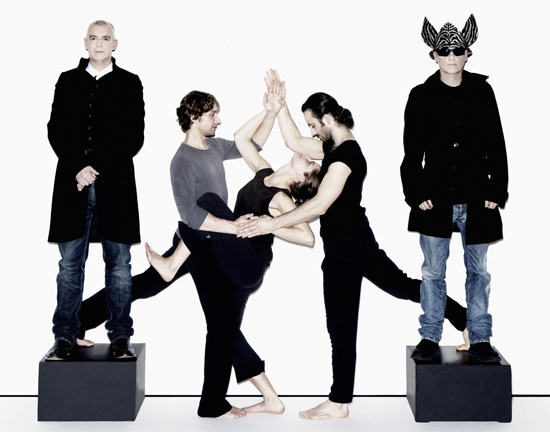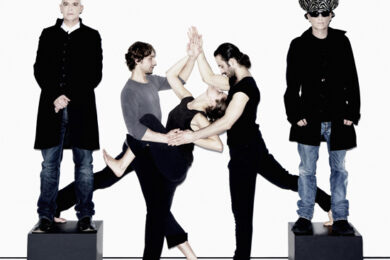When I interviewed The Pet Shop Boys back in 2009 for the esteemed Stool Pigeon newspaper, I posited that it was they who were the embodiment of the ideals of post punk – bringing art to the masses via various media, be it song or performance. The presentation of their music has always gone beyond the standard electropop format, with collaborations with the likes of Derek Jarman, Sam Taylor-Wood, and filmmaker Bruce Weber, among others. Their Battleship Potemkin soundtrack was a resounding triumph, though stage musical Closer To Heaven was given a frosty reception by fans and critics alike.
Neil Tennant and Chris Lowe have made their boldest theatrical statement yet by writing the music for a remarkable ten night run of The Most Incredible Thing, a ballet based on a fairy story by Hans Christian Andersen that tells the story of a king who offers half his kingdom and the hand of his daughter in marriage to anyone who can, in a public contest, create a dazzling artefact.
The ballet came about almost by accident, after dancer Ivan Putrov rang Neil Tennant and asked if Pet Shop Boys would ever consider writing a ballet for Sadler’s Wells. Two days later, and entirely unconnected, Lowe rang Tennant to suggest that The Most Incredible Thing might make a good Pet Shop Boys ballet. And lo! This most incredible coincidence became a stage show. Tennant and Lowe had nothing to do with the actual choreography, which was left to Javier De Frutos, who seems to have hit a perfect seam of duo’s aesthetic and sensibility – a fast moving set, militaristic dancing, and a Russian constructivist aesthetic. I spoke to Neil Tennant on the phone the morning after a performance of The Most Incredible Thing – for once, he has the joy of spending every night in the audience. Has it been a pleasurable experience getting to watch your music accompany the ballet?
Neil Tennant: Chris and I had nothing to do with the actual production, but it’s been a long project. We first approached Sadler’s Wells in 2007, and when we delivered the final music with the recording and everything at the beginning at January, we started work on our next album. Javier worked very much as an auteur, it was his vision, and his team, and that was great.
It does look very Pet Shop Boys
NT: There is a Russian, Constructivist feel, and he thought that was very Pet Shop Boys, very us.
It is something that’s fitted your aesthetic, from Battleship Potemkin to the Performance tour
NT: We did hack apart a statue of Stalin, and there’s always been this Russian thing, but this was all Javier, and his intuition. I don’t think that Chris and I thought the score sounded at all Russian. The melody when you see Karl the villain beating up his mates, that’s quite Russian, and I suppose our favourite ballet composers are all Russians.
I felt some of the set design and choreography looked as if it would have fitted with recent tours, like the Pandemonium stage set perhaps.
NT: I think a lot of that has to do with it being so recognisably our music. If you played something different along to it maybe it wouldn’t. But it’s not surprising we’re doing this, because since the Derek Jarman tour in 1989 we’ve really worked a lot on putting our music in a theatrical context, particularly with the performance tour but also when we did the Savoy Theatre with Sam Taylor-Wood, but also the Pandemonium tour. I think you can tell that the people who brought you the Most Incredible Thing are also the people who brought you our Glastonbury show last year. We are genuinely theatrical. We realised we didn’t have to have musicians on the stage, with it being digital music, and now we have Chris playing keyboards on the stage, but he and I are characters really. We don’t need musicians getting in the way, and Chris is part of the physical set.
What was your first experience of ballet?
NT: I grew up in Newcastle, and the Royal Ballet used to visit. I remember when I was about nine years old my mother took me and my sister to see Giselle, and I thought it was great. I decided I wanted to be a ballet dancer, and went to the local library and borrowed Teach Yourself Ballet, and forced my younger brother to try and do these exercises at the bar in my sisters bedroom, leaning against the radiator.
And as you got older?
NT: I think a lot of people when they think of ballet think of the Royal Opera House and it’s a world that’s alien to one, in a way. How do you go there? Who goes there? We got to know Ivan Petrov Through Sam Taylor-Wood, and we started going, the best one being Pierrot Lunaire by Shoenburg. Then in the 80s and early 90s we were going to the English National Opera a lot, when they were doing very controversial work putting opera in a non-traditional context. We wondered why ballet didn’t seem to do that. Classic ballet is rooted in the classical presentation. We wanted to take the feel of one of these ballets and do it in a totally different style, with our music. And that’s really what we set out to do here: our show has the same structure as a Tchaikovsky ballet.
How do you feel this best manifested itself?
NT: There are so many codes in classical ballet, so that it’s almost mime, with different moves meaning ‘I love you’ or ‘I want you’, and Javier hasn’t really done that. There’s no mime in it whatsoever. There are elements of classical ballet, but not very much, and that was a deliberate idea from the word go. There was a dance consultant brought in for the scenes with the fight with Karl’s gang.
I really liked that bit. Musically it was very heavy, and almost reminded me of Laibach. Did you have freedom to write music that was quite different to what you normally do?
NT: We had total freedom, we could have done anything that we wanted. When we were writing it we weren’t even thinking it was going to be released, but to our astonishment Parlophone really liked it and wanted to release it. So we were pushing ourselves, but we were pushing ourselves musically in that we had to write this really long piece of music with no words. This is the first time we’ve written orchestrally. With Battleship Potemkin we wrote eight bar patterns that the composer improvised on top of. With this, we didn’t want it to be repetitive because a lot happens in every scene. But there’s the little pop song at the beginning, and the track ‘The Grind’. Chris is hoping that somebody will come and pick that up and remix it.
If we could go back to talking about the idea that ballet hasn’t really got out of the ballet world and into pop…
NT: There’s actually probably more than you think. There’s the Joni Mitchell one, Twyla Tharp had a very successful one based on the music of Billy Joel, and an unsuccessful one based on the music of Bob Dylan
You can’t dance to Bob Dylan
NT: You can’t. But there are more pop and ballet meetings than you’d think. But what is rare is someone writing a big three act ballet, that is quite ambitious.
O2 Arena and the Sadler’s Wells Theatre: the Pet Shop Boys are perfect for all kinds of night out.
NT: Yes that is nice. And it’s sold out! 1500 tickets across ten nights, that’s a lot of people coming to see a ballet.
Do you feel proud of getting ballet out there?
NT: That’d be a bit worthy, it’s not like we’re trying to improve people’s minds. I just think it’s… we always try to do something that’s entertaining because it’s fresh. Our ambitions in the 90s were to write a stage musical, and we had a bit of a bad experience of that though I’m still very proud of that. Then there were lots of pop musicals, so it felt like a bit a cliché to work in that, though really most of those are just catalogue musicals. There’s just Elton John, and Boy George, and Bono and the Edge, who are having a rather ghastly time in New York at the moment. I’m sure they’re discovering that when you start to write musicals it’s a lot more difficult than you might have thought, because your music has got to work theatrically. I think we’re lucky that we can write music theatrically. It’s very difficult for rock music. There’s been a lot of debate over this, saying that rock music doesn’t work because the rhythmic dynamic of it is not particularly flexible.
We did the ballet simply because of the synchronisity of Ivan phoning up and asking if we’d write something for him, and then a couple of days later Chris saying he had an idea for a ballet based on the Most Incredible Thing, without knowing anything about the Ivan phone call. If these two things had happened separately it would never have happened. We’ll just have to wait and see what happens next…
The Most Incredible Thing will be touring before returning to Sadler’s Wells next year
The Most Incredible Thing will be touring before returning to Sadler’s Wells next year. The soundtrack to the ballet is out now on EMI. There’s also a Vinyl Factory Special Edition that comprises of a silk cloth bound hard board slipcase containing a hardback book with seven record sleeves; six of these house heavyweight 180-gram vinyl records pressed on the EMI 1400. The records feature the Pet Shop Boys’ music for the ballet, as well as exclusive original demo versions of each of the compositions, only available in this release.



